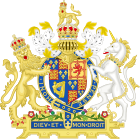Popish Recusants Act 1605 facts for kids
| Act of Parliament | |

|
|
| Long title | An Act to prevent and avoid dangers which may grow by Popish Recusants. |
|---|---|
| Citation | 3 Jas. 1. c. 4 |
| Dates | |
| Repealed | 13 April 1829 |
| Other legislation | |
| Repealed by | Roman Catholic Relief Act 1829 |
|
Status: Repealed
|
|
The Popish Recusants Act 1605 was a special law passed by the Parliament of England in 1605. This law came out right after the Gunpowder Plot in the same year. The plot was a secret plan by some English Roman Catholics to kill King James I and many members of Parliament.
Contents
What Was the Popish Recusants Act?
This law aimed to control Roman Catholics in England. It was one of several laws made after the Gunpowder Plot to make sure people were loyal to the King and the Church of England.
Why Was This Law Made?
The main reason for this law was the Gunpowder Plot. This was a very serious attempt to blow up the Houses of Parliament and kill King James I. After this plot, the government wanted to make sure that Roman Catholics who did not follow the Church of England were not a threat to the country.
What Did the Act Do?
The Popish Recusants Act introduced several strict rules for Roman Catholics.
Rules for Catholics
The Act stopped Roman Catholics from working in certain jobs. They could not be lawyers or doctors. They also could not act as a guardian (someone who looks after children) or a trustee (someone who manages money for others).
The law also allowed local officials, called magistrates, to search the homes of Roman Catholics. They were looking for weapons.
The Oath of Allegiance
A very important part of the Act was a new oath of allegiance. This was a special promise of loyalty. People had to swear that they were loyal to the King. The oath also said that the Pope did not have the power to remove kings from their throne.
Penalties for Not Following the Law
If a person was a "recusant" – meaning they refused to attend Church of England services – they faced harsh penalties. If they did not take part in the special church service called the Lord's Supper at least once a year at their local Church of England church, they could be fined a lot of money (£60). They could also lose two-thirds of their land.
The Act also made it a very serious crime, called high treason, to follow the Pope's rules instead of the King's.
See also
- Praemunire
- High treason in the United Kingdom

